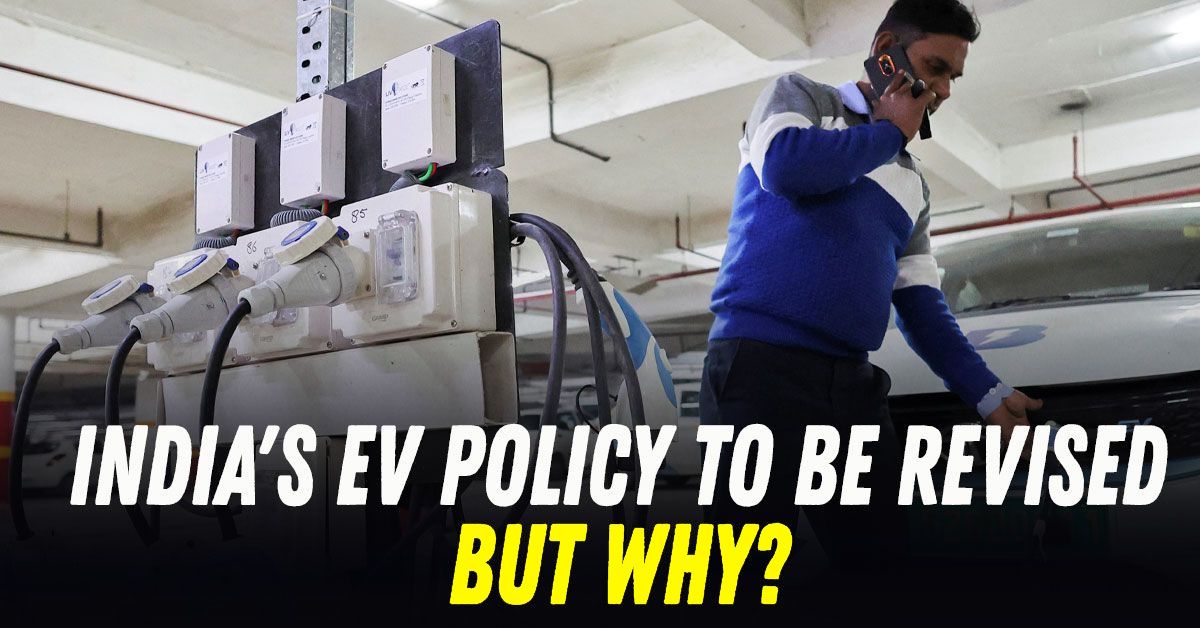Indian Government Is Rethinking EV Policy: Here's Why!


India has been actively pushing for EV adoption in the recent past. We have seen many startups taking electric vehicles seriously, and many legacy manufacturers getting aggressive about them, all backed by massive government incentives and favouring policies. It needs to be admitted that customer mindsets have also evolved over the years and many are now confident about putting their money on electric cars and two-wheelers. Things could soon take a U-turn! India might soon see some major policy changes because of the recent developments in China...
Representational Image
In April this year, China imposed a curb on the export of seven heavy rare earth metals including samarium, gadolinium, terbium, dysprosium, lutetium, scandium, and yttrium. This was a retaliatory response to the reciprocal tariff that the US administration had imposed on imports from China.
The impact of this move has started to reach automakers across the world. In the upcoming time, the same could impact the electric vehicle market in India as well. Indian manufacturers will soon face the consequences of the Chinese policy.
Taking Beijing's policy into consideration, the Indian government will likely rethink its EV policy and incentives. Top-level discussions around the same, are known to be underway. The government will take into consideration various geo-political conditions before announcing incentives for vehicular technology platforms.
Representational Image
At the time of writing this article, electric vehicles benefit from massive tax reductions. They are taxed at just five per cent. Internal Combustion Engine (ICE) vehicles, on the other hand, have significantly higher slabs. Lower duties play an important role in making them popular.
The central government's EV30@2030 vision is rather aggressive. It aims to achieve 30 percent EV adoption in the private vehicle (car) space. Under the new circumstances, this EV roadmap is likely to be put to review. The government will likely take a more relaxed approach towards EVs and shift the focus to other alternatives.
Rare Earth magnets, neodymium-iron-boron (NdFeB) magnets in particular, are key components in EV manufacturing. They are known for their strong magnetic fields and are thus used in the electric motors used in EVs.
Most electric vehicles these days, come with Permanent Magnet Synchronous Motors (PMSMs) which has rare earths as their key component. Besides motors, rare earths are also used in manufacturing power steering systems, wiper motors, and even braking systems. Their shortage could thus be dangerous for the EV space and the automotive industry at large.
Rare earth magnets are not exclusive to China. But the country controls more than 90 percent of rare earth processing worldwide. Japan and the US once enjoyed this lead. Today, however, it is Beijing that holds the reign. Countries like the United States and India depend heavily on China for sourcing rare earth magnets. Even Indian EV makers source these from China.
Representational Image
Beijing's stranglehold could thus lead to potential shortage of critical components including PMSMs, and delays in vehicle manufacturing. Another possibility is that of a price hike. These could eventually lead to a de-growth in India's cost and value-conscious EV market.
Foreseeing the potential hazards of the situation, Society of Indian Automobile Manufacturers (SIAM) and Automotive Component Manufacturers Association of India (ACMA) have asked the government to intervene and smoothen the process of procuring rare earths from Beijing.
Interestingly, there seems to be clear polarisation between India's union ministers in the direction that the country's mobility space should take. Nitin Gadkari, the Minister of Road Transport & Highways, is strongly advocating biofuel powered hybrids. These won't have dependency on China.
Union Minister of Commerce & Industry and MP Piyush Goyal, on the other hand, thinks electric vehicles are the future. His vision is to facilitate local manufacturing of EVs and their components, and a proportionate development of the EV ecosystem.
Yes, there are more factors that deter the central government from pursuing its aggressive EV push. The charging infrastructure is still growing. There is still time left before it develops to satisfactory levels. Till then, the pain points of EV ownership will stay.
'EVs are clean' is probably the biggest hoax served to Indian EV buyers. Most nations which have had fast EV adoptions, rely on renewable energy sources for their power generation needs. India, however, uses coal-fired thermal plants to generate most of its power. In this context, it makes little sense to call EVs as clean and non-polluting.
Time remains before we see how the policy evolves and how the rare earth export curb casts an impact on the EV industry here.